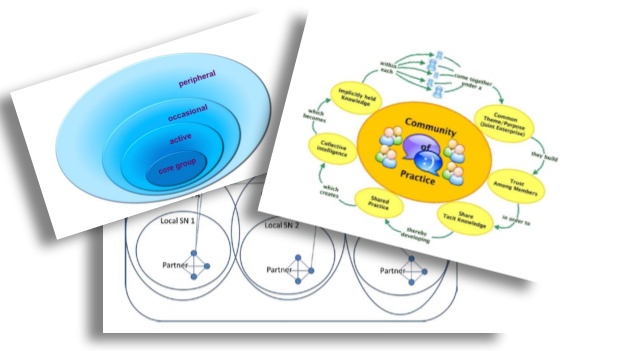Definition
A Community of Practice (CoP) is a group of people who share a common concern or passion, a set of problems, or an interest in an issue and who come together to meet individual and group goals.
The goal of the CoP is to share best practices and create new knowledge to promote mastery of professional practice. Continuous interaction is an important part of this.
What is the origin of community of practice?
Cognitive anthropologists Jean Lave and Etienne Wenger coined the term “community of practice” when studying, learning as a model of learning, a term referring to the community that acts as a living curriculum. Once the concept was articulated, researchers began to see communities everywhere, even when there was no formal system of learning.
Characteristics of Communities of Practice
We must be careful with the meaning “community” since not all have the same objective. For example, a neighbourhood is known as a community, but it does not have the following characteristics:
Domain. A community of practice is not simply a club of friends or a network of connections between people. It has an identity defined by a domain of shared interest. Therefore, membership implies a commitment to the domain and, therefore, a shared competence that distinguishes members from other people.
Community. By pursuing their interest in their domain, members participate in activities and actions jointly, also sharing information. Therefore, they build relationships with each other.
Practice. A CoP doesn’t just share interests (for example, a group of people who meet on Sundays to watch football or rugby). Members of a CoP are practitioners. They develop a repertoire of resources (experiences, tools, etc.), ways of tackling recurring problems, and so on.
The CoP of the CONSOLE project
The Community of Practice (CoP) in CONSOLE project is expected to play a key role in driving innovation in the effective and durable delivery of Agri-environmental climate public goods (AECPG). The CONSOLE CoP will be organized around professionals with experience in the provision of AECPG and those interested in it, and will be nurtured throughout the life of the project.
Therefore, the CONSOLE CoP is intended to facilitate knowledge exchange and mutual learning, mainly through virtual contacts. Participation in the CoP is based on the principle of sharing and reciprocity. A central objective of these guidelines is to ensure sound management and facilitation of the CoP of all CONSOLE partners in order to optimize the input of CoP members in project activities. Members within a national or local CONSOLE CoP are:
- CONSOLE partners;
- Practitioners, mainly farmers and foresters, who practice test and implement the contractual models, and
- Experts, who may have specific interventions at the CoP.
A vibrant CoP with the active participation of its members is crucial for the evaluation and testing of improved and novel voluntary measures for the delivery of AECPG. For each of the CONSOLE countries, a national contact person is designated to assume the role of national focal points for CoP activities in their country and serve as the CoP facilitator. These facilitators are responsible for ensuring participation throughout the various project tasks foreseen in various WPs and for overcoming possible language barriers. The national contact person can be supported by other CONSOLE partners in their country for local activities. At the local level, the CoP benefits from the existing contacts of CONSOLE partners with professionals, including experts interviewed for the analysis of the case studies within WP2.
